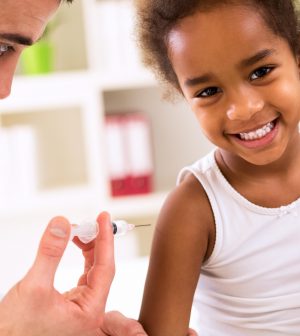- Could Artificial Sweeteners Be Aging the Brain Faster?
- Techniques for Soothing Your Nervous System
- Does the Water in Your House Smell Funny? Here’s Why
- Can a Daily Dose of Apple Cider Vinegar Actually Aid Weight Loss?
- 6 Health Beverages That Can Actually Spike Your Blood Sugar
- Treatment Options for Social Anxiety Disorder
- Understanding the Connection Between Anxiety and Depression
- How Daily Prunes Can Influence Cholesterol and Inflammation
- When to Take B12 for Better Absorption and Energy
- Epsom Salts: Health Benefits and Uses
Pfizer Says Its Booster Shot Bolsters Immune Response in Those Aged 5 to 11

Pfizer Inc. said Thursday that its booster shot raised levels of neutralizing antibodies against both the original coronavirus strain and the Omicron variant in children aged 5 to 11.
They said in a statement that they would ask the U.S. Food and Drug Administration to approve the emergency use of a booster for this age group “in the coming days.”
If that authorization is granted, eligibility for booster doses could expand to include 28 million more children. The FDA has typically acted within a month of receiving such requests.
The small study included 140 children who received a booster six months after their second dose.
Compared with one month after their second dose, the children had a sixfold increase in antibody levels against the original coronavirus strain one month after receiving the booster, and a subgroup of 30 children had 36 times more antibodies against the Omicron variant after the booster than after two doses, the company said.
Antibodies are the body’s first line of defense against infection.
The study, which has not been published or peer-reviewed, did not show how long antibodies lasted or the level of protection against COVID-19.
Now, people 12 and older in the United States are eligible for at least one booster, and about 30 million people aged 50 or older are eligible for a second booster. Studies suggest that a booster may be particularly important for children aged 5 to 11, according to The New York Times.
The Pfizer vaccine is the only one authorized for use in the United States for those younger than 18. One recent study found that while two Pfizer doses protected children in that age group against serious illness, they provided almost no protection against symptomatic infection, even just one month after the second shot, the Times reported.
“I think a bottom line is that in order to protect from the Omicron, we know from studies and from adults and adolescents that you need three doses,” Dr. Kathryn Edwards, a pediatric vaccine expert at Vanderbilt University School of Medicine in Nashville, told the Times. “So I think the FDA will likely approve the third dose for the 5- to 11-year-olds.”
Since the start of the pandemic, several hundred children aged 5 to 11 have died of COVID-19, according to data from the U.S. Centers for Disease Control and Prevention.
Only about 28% of children in that age group have received two vaccine doses and would be eligible for a booster, and 7% have received just one dose, CDC data show.
There’s been a slight bump in new coronavirus cases in the United States, fueled by various Omicron BA.2 subvariants, after two months of steady declines.
More information
Visit the U.S. Centers for Disease Control and Prevention for more on COVID boosters.
SOURCE: The New York Times
Source: HealthDay
Copyright © 2026 HealthDay. All rights reserved.










